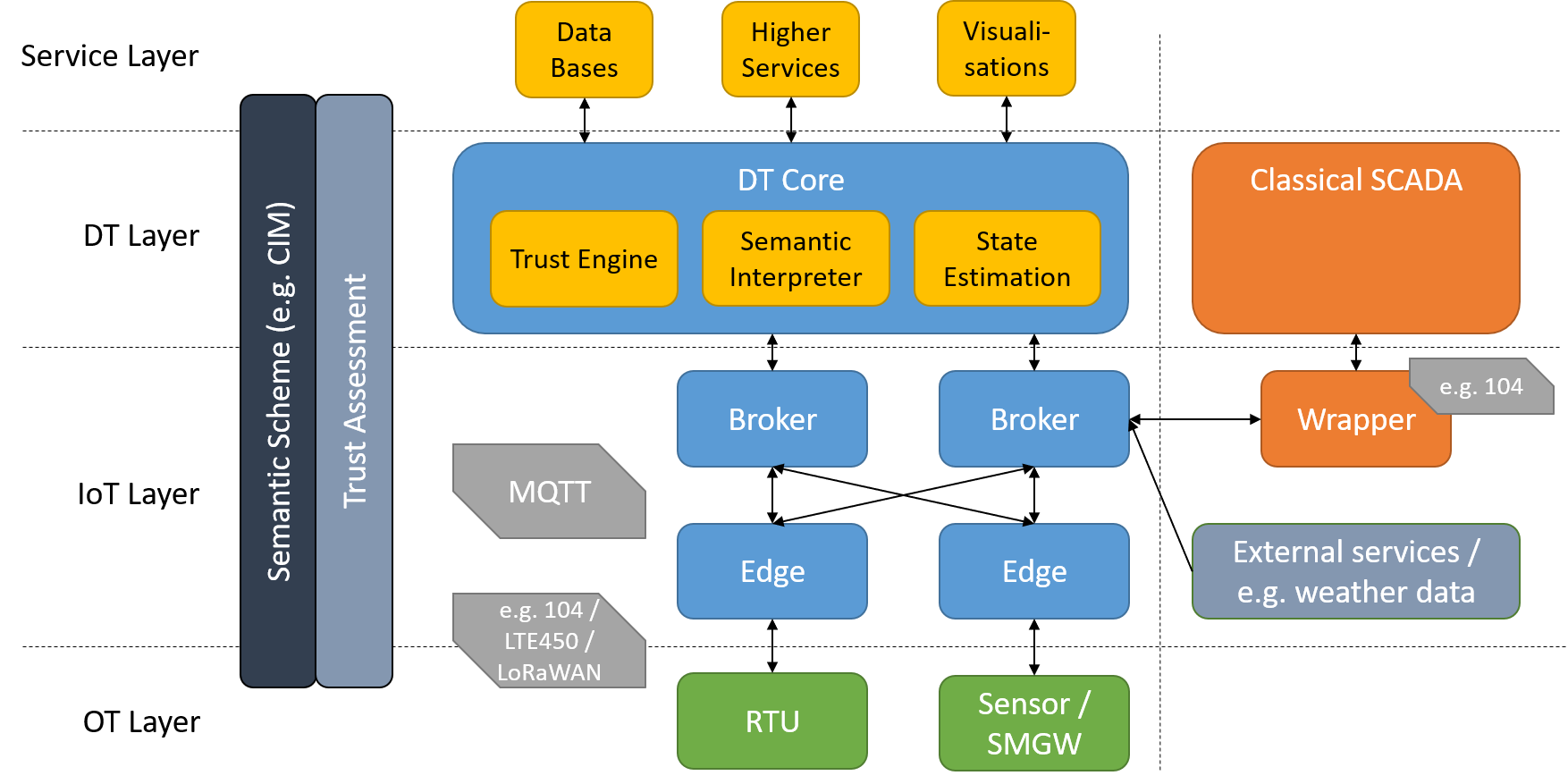
NextGen Grid Control How can the power grid of the future be monitored and controlled?
Control systems are a central element in managing critical infrastructures, particularly energy supply systems. They have evolved historically to become monolithic, proprietary, and generally "archaic" in their appearance and handling, requiring extensive expertise and lengthy qualification processes for operators.
This poses significant problems given the numerous challenges presented by the energy transition. Decentralized generation by small and micro-scale installations, even at lower voltage levels, leads to a substantial increase in complexity. Additionally, there is a growing need to couple different energy sectors and the associated IT systems in the background. These factors necessitate high automation and the introduction of new operational approaches, particularly innovative and potentially AI-based solutions. Accordingly, there is a drive among grid operators to harmonize and integrate control systems to enhance efficiency and enable the possibility of monitoring and controlling the grid for other, typically smaller, operators during specific periods (e.g., night shifts). However, this also increases the complexity for operating personnel, who are already facing more frequent critical grid conditions and rising threats from cyber-attacks.
Historically developed control systems are reaching their limits both internally and externally. Outdated software technologies and concepts result in natural performance limitations, including real-time capability, expandability, and maintainability. Regarding IT security, these systems are also constrained, as security was not a primary focus during their development, making it cumbersome to implement. The harmonization and integration of control systems sought by grid operators are largely, if not completely, hindered by vendor lock-in; the same applies to extending control systems with third-party functionalities.
Furthermore, the required expertise to operate these control systems is becoming scarce, exacerbated by the use of outdated software concepts. Today's workforce is trained on modern software and interaction concepts, making the use of outdated and archaic human-machine interaction software unintuitive and unattractive in the job market.
In summary, the challenges posed by the energy transition are increasingly difficult to address with current, antiquated control systems.

Another essential feature of NextGen Grid Control is the ability to holistically model (coupled) energy and ICT systems. The interactions between these systems will be crucial for resilient grid operation. The increasing interaction between the control system and external actors and installations further necessitates interoperability as a central goal, enabling third-party processes and applications to integrate with the control system. Specifically, defined interfaces are required to establish the foundation for modular interchange and extensibility.
Key technological aspects that make NextGen Grid Control future-proof include the use of digital twins and event-driven data stream processing. The concept of digital twins is particularly suitable because it goes beyond merely creating digital representations—potentially hierarchical or nested—by enabling automated adjustments to the physical infrastructure based on changes in the digital twin. The representation and modification of the physical infrastructure should occur in real time as much as possible. This real-time capability is achieved through the use of data stream processing, which allows for event-driven data processing, analysis, and visualization.
Research Questions
The ROC group focuses on, but is not limited to, the following research questions:
- How can control systems be designed to address current and future challenges of IoT-based CPESs?
- How can CPES services be (re)designed using the functionalities of NextGen Grid Control?
- How can HMIs for grid control be designed to be intuitive and purpose-driven, while also being as automated as possible in their creation?
Persons
- Dr. Michael Brand (Contact Person)
- Kersten Blümel
- Nils Huxoll
- Amin Raeiszadeh

Persons 
B
H
L
N
P
R
W
Projects 
2025
VITAL
Verteilte Infrastrukturen für Technologie-Gestützte Innovationen im Verteilnetz
Duration: 2025 - 20262021
2020
ReMoDigital
Resilience Monitoring for the Digitization of the Energy Transition
Duration: 2020 - 2024 VORAUS PV
Entwicklung von Vorehrsagealgorithmen für Ausfälle in komplexen leistungselektronischen Systemen in der Photovoltaik
Duration: 2020 - 2023 SiNED
Systemdienstleistungen für sichere Stromnetze in Zeiten fortschreitender Energiewende und digitaler Transformation
Duration: 2020 - 20242017
2016
NetzDatenStrom
Standardkonforme Integration quelloffener Big Data-Lösungen in existierende Netzleitsysteme (sorry - only available in German)
Duration: 2016 - 2020 Publications 
2026
Resilience of Digitalized Power Systems-Challenges and Solutions
Brand, Michael and Stark, Sanja and Holly, Stefanie and Kamsamrong, Jirapa and Mayer, Christoph and Lehnhoff, Sebastian; Towards Energy System Resilience; 2026
Shaping and Monitoring Resilient Energy Systems—A Synthesis
van Doren, Davy and Droste-Franke, Bert and Brand, Michael and Derendorf, Karen and Fohr, Gabriele and Gils, Hans Christian and Kaiser, Matthias and Knieling, Jörg and Lehnhoff, Sebastian and von Maydell, Karsten and others; Towards Energy System Resilience; 2026
2025
Management of Topological Data in Modular Energy Management Systems
Blümel, Kersten and Brand, Michael and Lehnhoff, Sebastian; 2025 IEEE PES Innovative Smart Grid Technologies Conference Europe (ISGT Europe); Oct / 2025
Next Generation Grid Control: A Modular and Scalable Event-Driven Architecture for Monitoring and Control of Power Systems
Brand, Michael and Blümel, Kersten and Bruhn, Jan-Henrik and Fatemi, Armin and Huxoll, Nils and Lehnhoff, Sebastian; 2025 IEEE Kiel PowerTech; 2025
OpenEnergyTwin-Open, Interoperable and User-Centered Platform for Sustainable Energy Systems
Brand, Michael and Bruhn, Jan Henrik and Huxoll, Nils and Schmidtke, Florian and Wirtz, Nikolaus and Andres, Michael and Fatemi, Armin and Selimaj, Antigona and Ulbig, Andreas and Lehnhoff, Sebastian; ETG Kongress 2025; Voller Energie-heute und morgen.; 2025
Poster Abstract: A Digital Twin Platform Applied to Hydrogen Electrolyzers
Amit Kumar Singh, Jelke Wibbeke, Amin Raeiszahdeh, Nils Huxoll, Michael Brand; DACH+ Conference on Energy Informatics 2024; February / 2025
Poster Abstract: Management of Topological Data in Modular Energy Management Systems
Kersten Blümel, Michael Brand, Sebastian Lehnhoff; Energy Informatics Review, Volume 3, Issue 3, September 2025; September / 2025
Resilience Monitoring for the Digitalisation of the Energy Transition (ReMoDigital)
Bert Droste-Franke and Gabriele Fohr and Davy van Doren and Markus Voge and Moritz Bergfeld and Urte Brand-Daniels and Karen Derendorf and Marc Dziakowski and Hans Christian Gils and Ghinwa Harb and Gandhi Pragada and Tudor Mocanu and Sophie Nägele and Henrik Netz and Martin Plener and Angelika Schulz and Henning Wigger and Madhura Yeligeti and Michael Brand and Batoul Hage Hassan and Anand Narayan and Sigrid Prehofer; January / 2025
2024
Applying Trust for Operational States of ICT-Enabled Power Grid Services
Michael Brand, Anand Narayan, Sebastian Lehnhoff; April / 2024
Modelling the propagation of properties across services in cyber-physical energy systems
Anand Narayan, Michael Brand, Nils Huxoll, Batoul Hage Hassan, Sebastian Lehnhoff ; March / 2024
